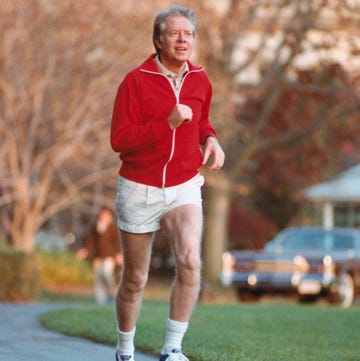Mo Farah of Great Britain used his trademark kick to take Saturday night’s 10,000-meter race and become only the sixth man in history to win two Olympic titles at the distance.
Farah easily recovered from an early fall and handled the team tactics thrown at him by the Ethiopian and Kenyan squads. He took the lead for good over the last half lap to win in 27:05.17. Kenyan Paul Tanui, who took the lead on the bell lap but was unable to hold off Farah on the backstretch, was second in 27:05.64. Tamirat Tola of Ethiopia took the bronze in 27:06.26.
American Galen Rupp, who was part of the pack of five together at the beginning of the final lap, finished fifth in 27:08.92. The other Americans, Leonard Korir and Shadrack Kipchirchir, were 14th and 19th, respectively, in 27:35.65 and 27:58.32.
Since finishing second in the 10,000 at the 2011 World Championships, Farah has won eight straight Olympic or world titles at 5,000 or 10,000 meters. All of his wins have come thanks to an unmatchable sprint finish over the last lap.
“As each lap went down I was getting more confident and confident and confident,” Farah said. “I was thinking [to] try to make sure I have something at the end.”
Given his kick, his rivals in last year’s world meet and tonight’s Olympic race attempted to push hard in the second half to drain his finishing speed. In Rio, that effort came from separate attacks by Tanui and his two Kenyan teammates, and Tola and his compatriot Yigram Demelash, the fastest man in the world this year.
The pace heated up after a modest first half of 13:53.11. It was so modest that when Rupp and Farah got tangled and Farah fell to the track in the fourth kilometer, he was able to rejoin the lead pack with ease.
“Galen, he’s a great sportsman and things happen sometimes,” Farah said. “It’s so easy to blame people with things out of your control. I have got such a long stride, I don’t blame him. He tried to help me.”
Rupp acknowledged he caused Farah to go down. “I’m just thankful it didn’t have any effect on the outcome,” he said. “It just goes to show how he’s able to keep a level head, doesn’t let things bother him, and he’s still able to execute.”
What had been laps in the 65- to 67-second range became 64s, then 62s as Demelash led through 8K in 22:00.83. The ninth kilometer was even faster, 2:36, but with the finish within sniffing distance, not fast enough to break Farah.
By defending the Olympic title he won in 2012, Farah joined a list of legends who have won two Olympic 10,000-meter golds: Paavo Nurmi of Finland (1920 and 1928), Emil Zatopek of Czechoslovakia (1948 and 1952), Lasse Viren of Finland (1972 and 1976), and Haile Gebreselassie (1996 and 2000) and Kenenisa Bekele (2004 and 2008) of Ethiopia.
Farah and others from tonight’s race will return to the track Wednesday morning for the qualifying heats of the 5,000. Rupp will head in the other direction, and now focus on recovering from a strong 10,000 before doubling back for the marathon on Sunday, August 21.

Scott is a veteran running, fitness, and health journalist who has held senior editorial positions at Runner’s World and Running Times. Much of his writing translates sport science research and elite best practices into practical guidance for everyday athletes. He is the author or coauthor of several running books, including The Top Celebrity Marathon Times of 2024, Advanced Marathoning, and Best Running Shoes 2025. USATF to Elect New President Amid Budget Deficit Slate, The Atlantic, the Washington Post, and other members of the sedentary media. His lifetime running odometer is past 110,000 miles, but he’s as much in love as ever.













